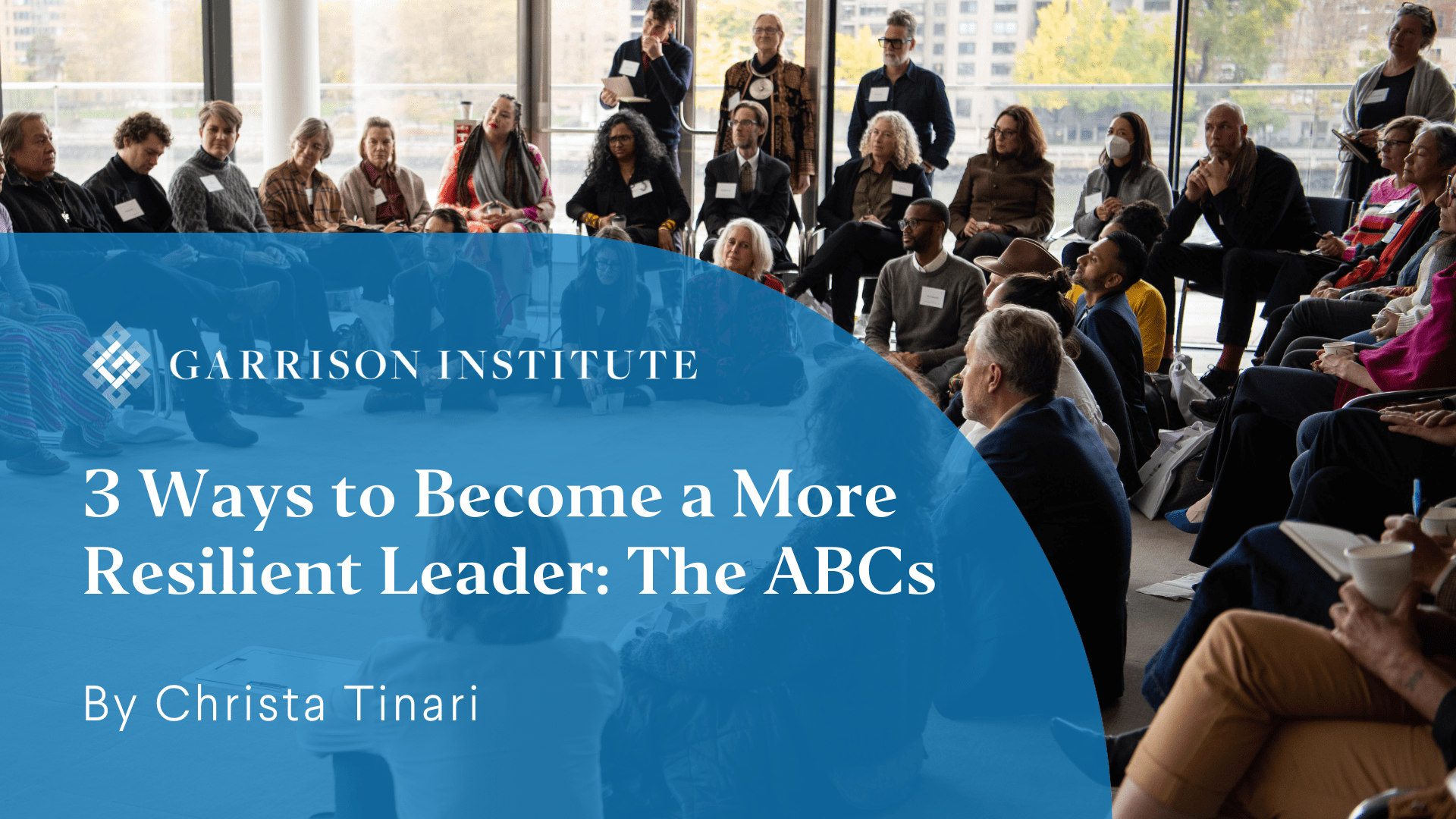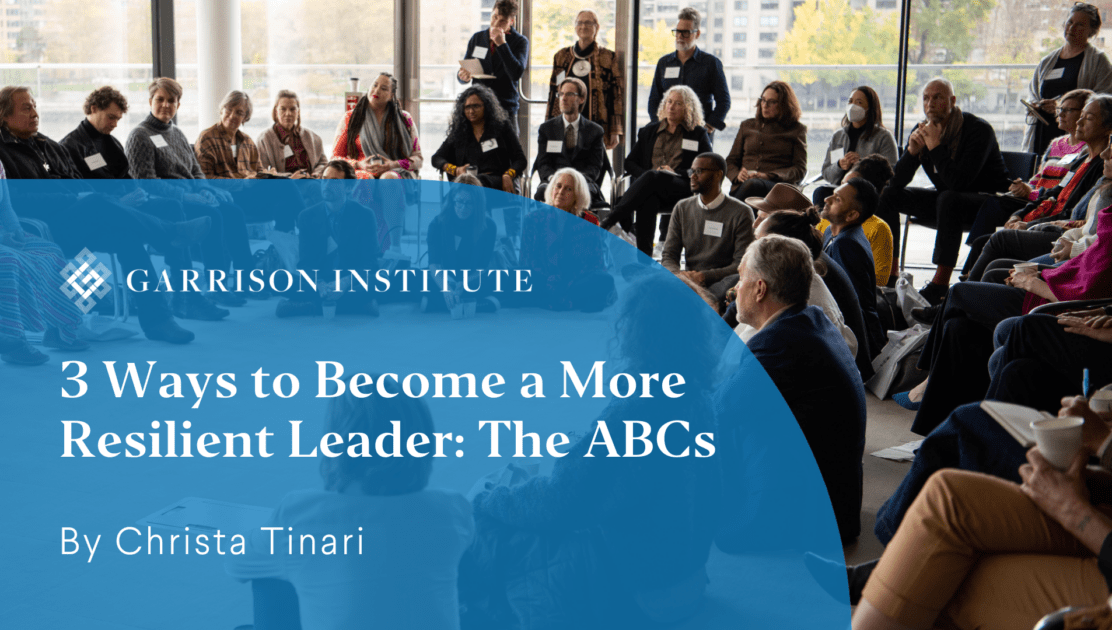3 Ways to Become a More Resilient Leader: The ABCs
By Christa M. Tinari
A Demanding Job
It’s no secret that non-profit leaders are stressed by the demanding responsibilities of their jobs. According to a study published in the Nonprofit Management & Leadership journal, major stressors include financial constraints, resource limitations, and the pressure to achieve ambitious goals while serving diverse stakeholders (Doherty, 2019). The emotional toll of working with vulnerable populations while attempting to address complex social issues creates an additional burden. Left unmanaged, stress reduces leaders’ effectiveness and leads to burnout. Research conducted by the Bridgespan Group highlights that burnout among non-profit leaders can lead to decreased productivity, diminished creativity, and, ultimately, organizational stagnation (Bridgespan Group, 2020). High stress levels also impair decision-making abilities and can negatively impact relationships, undermining a leader’s effectiveness.
The Case for Cultivating Resilience
Investing in stress management skills is not only a matter of personal well-being but also a strategic imperative for non-profit organizations. Neuroscientist Dr. Richard Davidson emphasizes the importance of mindfulness practices in reducing stress and enhancing resilience (Davidson, 2018). Personal resilience can be defined as the ability to access the resources one needs to navigate and learn from challenges, adapt to change, recover from adverse situations, and thrive despite hardships. Resilience is a natural capacity that can be strengthened over time. Proactive resilience includes the degree to which one is prepared to face life’s challenges with positive strategies, habits, and mindsets that foster a resilient response. The Contemplative-Based Resilience Project at The Garrison Institute has developed a research-based framework to support the proactive development of resilience among non-profit leaders. This framework focuses on the ABCs of Resilience: Awareness, Balance, and Connection while emphasizing compassion towards self and others.
Develop Mindful Awareness
Awareness involves being attentive, observant, and mindful of one’s inner thoughts, emotions, sensations, surroundings, and experiences. Attention is an active process, relating to our ability to direct our awareness onto a desired object, thought, emotion, sensation, problem, and so on. Mindfulness researcher Dr. Jon Kabat-Zinn defines mindful awareness as the practice of paying attention to the present moment with openness, curiosity, and acceptance. Mindful awareness can be cultivated through meditation practices in which you focus your attention on a chosen object, gently noticing when your mind has wandered, and bringing it back to the chosen object of focus. You can also practice non-judgmental awareness of your thoughts, emotions, and sensations, which allows you to find space for discernment before reacting to a situation.
A research paper published by The Garrison Institute (Thaddeus & Sivilli, 2014) integrated findings from more than 280 interdisciplinary studies linking contemplative practices (such as mindfulness meditation) to resilience. That research found that mindfulness meditation enhances our abilities to regulate mood, interrupt negative thought patterns, regulate the nervous system, and engage in more creative and flexible thinking in times of crisis. Over time, mindful meditation practice strengthens your ability to be more in control of your mind, rather than allowing it to engage in unhelpful habits such as rumination, blame, shame, and so on. By training the mind to focus on the present moment, leaders can enhance their ability to respond skillfully to challenges and maintain a focused calm in the face of unexpected adversity.
Balance Your Body Through Movement
Have you ever neglected to drink enough water, eat properly, or take a walk because you were too busy at work? You’re not alone. But tending to your body is just as important as tending to your to-do list. Many leaders use exercise as a stress relief strategy, while others find it challenging to find the time for bodily self-care. Movement can be a powerful way to improve overall strength, flexibility, and circulation (which positively impacts bone, heart, and brain health), relieve stress and boost mood (through the release of endorphins), improve sleep, and improve self-esteem.
Movement that is engaged in with mindful attention can also help you get more in touch with the body’s signals about nervous system regulation. Trauma researcher Dr. Bessel van der Kolk and others have explained how events can trigger a flight-fight-freeze response in the body in which the nervous system is activated to respond to stressors. If the body continues in this heightened state without relief, the cortisol released into the bloodstream may cause inflammation which damages the body. You can use mindful movement, yoga, and breathing practices to tune into your body and to bring your body back to balance. Over time, you will also become more aware of when your body feels depleted and when it is time to take a break and attend to your basic needs amidst your busy day. Balancing the body also provides psychological benefits that can improve leadership capabilities. Nervous system regulation contributes to mental clarity which can aid in balancing priorities and responsible decision making.
Connect with Peers
There is a saying: it’s lonely at the top. Leaders need to seek out and join networks where they can connect with peers who understand the demands of their positions and the unique challenges they face. Vulnerability expert Dr. Brené Brown emphasizes the importance of safe spaces where people can speak about their hopes, concerns, strengths, and weaknesses (Brown, 2012). Through candid discussions in peer networks, leaders can validate each other’s experiences and share insights and best practices within a supportive peer group. This can help leaders gain practical knowledge while decreasing feelings of isolation often experienced by executives and those in upper management positions. Neuroscientist Dr. Richard J. Davidson highlights the role of social connections in promoting mental and emotional health (Davidson, 2012). By building strong relationships with their peers, non-profit leaders can cultivate a supportive community that buffers against stress and fosters resilience in challenging times.
Connecting also contributes to leadership effectiveness. Peer gatherings allow non-profit leaders to forge collaborative partnerships that amplify their impact. Organizational Psychologist Dr. Adam Grant identified the importance of networking and collaboration in driving innovation and success (Grant, 2013). By building trust and rapport with their peers, leaders can lay the foundation for meaningful collaborations.
Compassion
Finally, the ABCs framework also includes compassion. Compassion emphasizes cultivating kindness, empathy, and connection with oneself and others. In times of stress and adversity, individuals may be tempted to be self-critical or judgmental, undermining their confidence and damaging working relationships. Non-profit leaders have lofty goals and are committed to helping others; they frequently feel they could be doing more to impact a greater number of people. Compassion practices, such as loving-kindness meditation and self-compassion exercises taught by meditation teachers Sharon Salzberg, Dr. Kristin Neff and others, help individuals cultivate a sense of kindness and acceptance toward themselves and others. An important aspect of compassion is cultivating realistic expectations about one’s strengths and weaknesses and about what one is actually able to do.
In “Awakening Compassion at Work” co-author Dr. Monica Worline highlights that leaders who cultivate compassion within their organizations benefit in several ways. Compassionate leaders are perceived as more trustworthy, approachable, and authentic by their employees. This fosters a positive organizational culture built on mutual respect and psychological safety (Worline & Dutton, 2017). Compassionate leadership enhances employee engagement and commitment, as employees feel valued and supported. Finally, compassionate leaders are better equipped to navigate challenging situations with empathy and grace, fostering resilience and adaptability within their teams.
You Can Become a More Resilient Leader
Leaders require proactive development of resilience to maintain their well-being, effectively lead their organizations, and accomplish their mission-driven goals. Engaging in practices to develop skills in awareness, balance, connection, and compassion will benefit yourself and those you serve. Making even a small change in any one of these areas can contribute to your preparedness to face the inevitable challenges of leadership.
Christa M. Tinari is Director of the Contemplative-Based Resilience Project at The Garrison Institute, NY. To learn more about The Resilient Leaders Network for non-profit leaders in the lower Hudson Valley region, please visit https://www.garrisoninstitute.org/event/the-resilient-leaders-network-april-2024-september-2024/.
Sources
- Brown, B. (2012). Daring Greatly: How the Courage to Be Vulnerable Transforms the Way We Live, Love, Parent, and Lead.
- Davidson, R. J. (2012). The Emotional Life of Your Brain.
- Goleman, D. (2014). Emotional Intelligence: Why It Can Matter More Than IQ.
- Grant, A. (2013). Give and Take: Why Helping Others Drives Our Success.
- Kabat-Zinn, J. (2013). Full Catastrophe Living: Using the Wisdom of Your Body and Mind to Face Stress, Pain, and Illness.
- Langer, E. J. (1989). Mindfulness.
- Neff, K. D. (2012). The Science of Self-Compassion
- Senge, P. M. (1990). The Fifth Discipline: The Art and Practice of the Learning Organization.
- Wheatley, M. J. (2006). Leadership and the New Science: Discovering Order in a Chaotic World.
- Worline, M. C., & Dutton, J. E. (2017). Awakening Compassion at Work: The Quiet Power That Elevates People and Organizations.
- Doherty, A. J. (2019). Understanding stress in nonprofit executive directors: A mixed-methods study. Nonprofit Management & Leadership, 29(4), 625-644.
- Bridgespan Group. (2020). The Social Sector’s “Burnout” Problem is a Leadership Problem. Retrieved from https://www.bridgespan.org/insights/library/leadership-development/nonprofit-burnout-problem-is-a-leadership-problem
- Davidson, R. J. (2018). Center for Healthy Minds. Retrieved from https://centerhealthyminds.org
- Stanford Social Innovation Review (SSIR). (2021). Strategies for Nonprofit Leaders to Support Their Well-Being. Retrieved from https://ssir.org/articles/entry/strategies_for_nonprofit_leaders_to_support_their_well_being

